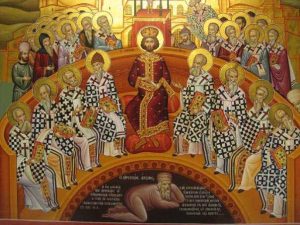 In addition to the observance of the 8th Sunday after Pentecost, the Church remembers the Father of the First 6 Ecumenical Councils. Moreover, the Church also liturgically recalls the memory of the Great Holy Prince, and Equal to the Apostles, Saint Vladimir.
In addition to the observance of the 8th Sunday after Pentecost, the Church remembers the Father of the First 6 Ecumenical Councils. Moreover, the Church also liturgically recalls the memory of the Great Holy Prince, and Equal to the Apostles, Saint Vladimir.
Today we celebrate the memory of the church teachers and pastors who in six councils held over three plus centuries (325-680) defined for us and for our faith who Jesus our Lord is. The central affirmation was in the Council of Chalcedon, whose fathers professed: “we all with one voice teach the confession of one and the same Son, our Lord Jesus Christ: the same perfect in divinity and perfect in humanity, the same truly God and truly man, of a rational soul and a body; of one essence with the Father as regards his divinity, and the same of one essence with us as regards his humanity; like us in all respects except for sin; begotten before the ages from the Father as regards his divinity, and in the last days, for us and for our salvation, the same born of Mary, the virgin God-bearer, as regards his humanity.” Even though the Oriental Orthodox Churches did not accept this council for political and semantic reasons, there is no doubt that they believe that our Lord is truly God and truly a human being, because this is essential for our faith. This feast reminds us that we are through faith truly united with God, who transforms us and restores the divine likeness.
St. Maximus the Confessor especially emphasizes this in his theology, in many places, as in his Ambigua 4,8: “For there is nothing more unified than He, who is truly one, and apart from Him there is nothing [1045A] more completely unifying or preserving of what is properly His own. Thus, even when He suffered, He was truly God, and when He worked miracles the same one was truly man, for He was the true hypostasis of true natures united in an ineffable union. Acting in both of these natures in a manner suitable and consistent with each, He was shown forth as one truly preserving them unconfused, while, at the same time, preserving Himself without change, insofar as He remained impassible by nature and passible, immortal and mortal, visible to the eyes and known by the intellect, as God by nature and man by nature.”
This is the real value of dogma, it tells us of the possibilities we have as human beings. It guides us to our full human nature, and perfection as commanded by Christ, “So be perfect, just as your heavenly Father is perfect. (Matthew 5:48)” It is the height of pride to think that we can reach our full potential without God, who alone creates, redeems and perfects our human nature.
Meditation by Archpriest David Petras
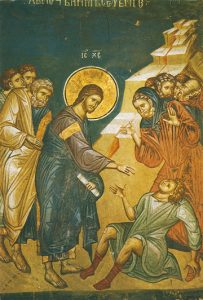 Read: 1 Corinthians 4:9-16; Matthew 17:14-23
Read: 1 Corinthians 4:9-16; Matthew 17:14-23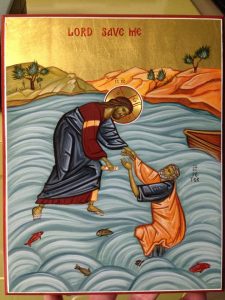 Read: 1 Corinthians 3:9-17; Matthew 14:22-34
Read: 1 Corinthians 3:9-17; Matthew 14:22-34 In addition to the observance of the 8th Sunday after Pentecost, the Church remembers the Father of the First 6 Ecumenical Councils. Moreover, the Church also liturgically recalls the memory of the Great Holy Prince, and Equal to the Apostles, Saint Vladimir.
In addition to the observance of the 8th Sunday after Pentecost, the Church remembers the Father of the First 6 Ecumenical Councils. Moreover, the Church also liturgically recalls the memory of the Great Holy Prince, and Equal to the Apostles, Saint Vladimir.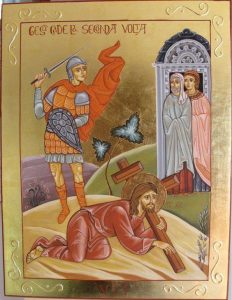 Read: 1 Corinthians 1:10-18; Matthew 14:14-22
Read: 1 Corinthians 1:10-18; Matthew 14:14-22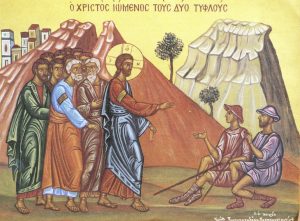 Read: Romans 15:1-7; Matthew 9:27-35
Read: Romans 15:1-7; Matthew 9:27-35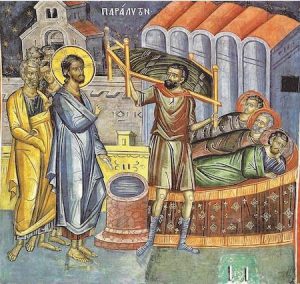 Read: Matthew 9:1-8
Read: Matthew 9:1-8 Read: Romans 5:1-10. What does mercy really mean. God reveals himself as mercy. When Moses asks to see God, God responds: “The Lord came down in a cloud and stood with him there and proclaimed the name, “Lord.” So the Lord passed before him and proclaimed: The Lord, the Lord, a God gracious and merciful, slow to anger and abounding in love and fidelity.”
Read: Romans 5:1-10. What does mercy really mean. God reveals himself as mercy. When Moses asks to see God, God responds: “The Lord came down in a cloud and stood with him there and proclaimed the name, “Lord.” So the Lord passed before him and proclaimed: The Lord, the Lord, a God gracious and merciful, slow to anger and abounding in love and fidelity.”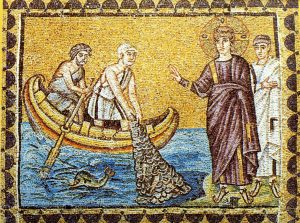 What does it mean to be a saint? Our Lord said, “I am the way, the truth and the life” (John 14:6). To be a saint, then, means to follow Jesus the Way, the true path to union with God and holiness. To be a saint is not a luxury for the few, but the necessity for all of us who want to know the truth, to live in Christ. In today’s Gospel, Jesus calls Peter and Andrew and John and James, and they IMMEDIATELY follow him. This call is given to us all. We have been meditating on Pope Francis’ Apostolic Exhortation, Gaudete et Exsultate – Rejoice and Exalt!
What does it mean to be a saint? Our Lord said, “I am the way, the truth and the life” (John 14:6). To be a saint, then, means to follow Jesus the Way, the true path to union with God and holiness. To be a saint is not a luxury for the few, but the necessity for all of us who want to know the truth, to live in Christ. In today’s Gospel, Jesus calls Peter and Andrew and John and James, and they IMMEDIATELY follow him. This call is given to us all. We have been meditating on Pope Francis’ Apostolic Exhortation, Gaudete et Exsultate – Rejoice and Exalt!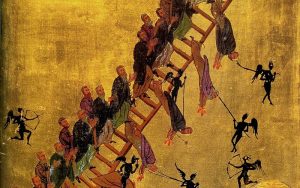 Fourth Sunday of the Great Fast: Commemoration of our Holy Father John of the Ladder
Fourth Sunday of the Great Fast: Commemoration of our Holy Father John of the Ladder